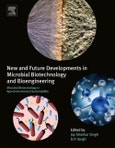New and Future Developments in Microbial Biotechnology and Bioengineering: Microbial Biotechnology in Agro-environmental Sustainability describes, in detail, the various roles of microbial resources in the management of crop diseases and how microbes can be used as a source of income for biomass and bioenergy production. In addition, the book covers microbial inoculants as bio-fertilizers to enhance crop productivity, along with degraded land restoration. Users will find the latest information in the field of microbial biotechnology and its further applications in bio-fertilizers, bio-pesticides, its generation as an alternative source of energy, restoration degraded and marginal lands, the mitigation of global warming gases, and more.
Please Note: This is an On Demand product, delivery may take up to 11 working days after payment has been received.
Table of Contents
1. Activity and Diversity of Aerobic Methanotrophs in Thermal Springs of the Russian Far East 2. Promoting Crop Growth with Symbiotic Microbes in Agro-Ecosystems in Climate Change Era 3. Bacillus: Plant Growth Promoting Bacteria for Sustainable Agriculture and Environment 4. Role of Microbes in Restoration Ecology and Ecosystem Services 5. The Role of Plant-Associated Bacteria in Phytoremediation of Trace Metals in Contaminated Soils 6. Algae as a Sustainable and Renewable Bioresource for Bio-Fuel Production 7. A Green Nano-Synthesis to Explore the Plant-Microbe Interactions 8. Microbial Biotechnology: A Promising Implement for Sustainable Agriculture 9. Rhizospheric Microbial Diversity: An Important Component for Abiotic Stress Management in Crop Plants Toward Sustainable Agriculture 10. Functional Importance of the Phyllosphere Microbiome and Its Implications in Agriculture 11. Fungi as Promising Biofuel Resource 12. Arbuscular Mycorrhizae: Natural Ecological Engineers for Agro-Ecosystem Sustainability 13. Biocontrol Strategies for Effective Management of Phytopathogenic Fungi Associated With Cereals 14. Municipal Solid Waste to Bioenergy: Current Status, Opportunities and Challenges in Indian Context 15. Microbes as Bio-Resource for Sustainable Production of Biofuels and Other Bioenergy Products 16. Microbes-Assisted Remediation of Metal Polluted Soils 17. The Prospects of Bio-Fertilizer Technology for Productive and Sustainable Agricultural Growth 18. Plant-Microbe Interactions in Ecosystems Functioning and Sustainability 19. Azotobacter- A Natural Resource for Bioremediation of Toxic Pesticides in Soil Ecosystems 20. Significances of Fungi in Bioremediation of Contaminated Soil 21. Microalgae-Assisted Phyco-Remediation and Energy Crisis Solution: Challenges and Opportunity








